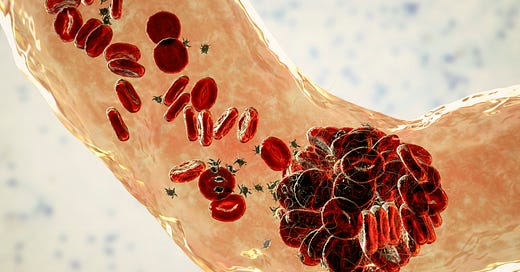Hi Dr. Jen. I am so happy to have found your site. I am a 60 year and post menopause. I have Leiden Factor V ( blood clotting disorder) which was diagnosed after knee surgery and a clot in my calf. So I have been cautious, even afraid of HRT. I have arthritis in my knees and hands, hot flashes and night sweats for the last 10 years. Does HRT help with arthritis/ joint pain? I have seen advertisements stating joint issues are the result of menopause. Can you please comment? Is there safe HRT based on my clotting issue? With gratitude
Via The Vajenda
***
Questions about the safety of estrogen in menopausal hormone therapy (MHT) for women with a clotting disorder come up a lot, so I’m glad you asked!
For those of you who may not know, factor V Leiden is a genetic condition associated with an increased risk of blood clots. People who carry one copy of factor V Leiden gene have a 5-7 fold increased risk of blood clots and carrying two copies increases the risk of blood clots by 25- to 50-fold. However, even if you don’t carry this genetic risk, many women on menopausal hormone therapy have other risk factors for blood clots and the risk of blood clots also increases with age, so learning more about estrogen, blood clots, and menopause is important for everyone.
Estrogen and Blood Clots
The question about menopausal hormone therapy and clotting comes up because we know that oral contraception with estrogen increases the risk of blood clots, both typical ones in the veins (DVT or deep venous thrombosis) and less common ones that can happen in arteries. These clots can be serious, causing pulmonary embolism and stroke, and can sometimes even be fatal. The increased risk of clots with the pill is about 2-3 times over baseline, although it’s lower than the risk of clots incurred in pregnancy or in the three months after delivery.
Given how low the risk of blood clots is overall for women of reproductive age, the absolute number of people negatively affected by clots caused related to oral contraception is still quite low. For perspective, the risk of blood clots for an otherwise healthy reproductive aged woman is about 1-5/10,000 per year. Although the low chances of this happening should not downplay the significance.
Because of this risk of clotting, we strongly recommend against the estrogen-containing pill for people with an increased risk for clots, such as people who have migraines with aura or a genetic condition that increases the risk of clotting, such as factor V Leiden. In fact, the risk of a blood clot in the legs or the lungs (a pulmonary embolism) is 35 times higher for someone with factor V Leiden who takes an estrogen-containing birth control pill.
However, the estrogen in the pill is a higher dose than in evidence-based menopausal hormone therapy, so it’s reasonable to wonder if this risk is also seen with the lower doses of menopausal hormone therapy and if so, how does that apply to someone at higher risk?
It is important to keep in mind that all the studies looking at menopausal hormone therapy and risk of blood clots (and risk in general) only apply to pharmaceutical preparations in standard doses, meaning a 100 mcg patch, a 2 mg estradiol tablet, or equivalent spray/lotion/vaginal ring, or a lower dose. We cannot tell you anything about clotting risk if you are using any therapies that have not been studied, such as compounded hormones (which have unpredictable dosing and absorption), excessive dosing of a pharmaceutical product beyond the standard dose (as seems to happen in some private clinics in the United Kingdom), or hormone pellets (also often associated with massive doses). These unstudied therapies are also not recommended independent of clotting risk, by experts such as the North American Menopause Society, the British Menopause Society, and the Endocrine society.
[Note: I will be writing a series taking a deep dive into estrogen-doses and menopausal hormone therapy as there is so much disinformation out there about unstudied therapies so stay tuned for that.]
The Effect of Menopausal Hormone Therapy on Blood Clotting
Several studies, for example the Women’s Health Initiative (WHI) and the Heart and Estrogen/Progestin Replacement Study (HERS) tell us that oral menopausal hormone therapy is associated with an overall increased risk of blood clots. This risk is about double what is expected for someone not taking hormones.
Keep reading with a 7-day free trial
Subscribe to The Vajenda to keep reading this post and get 7 days of free access to the full post archives.




